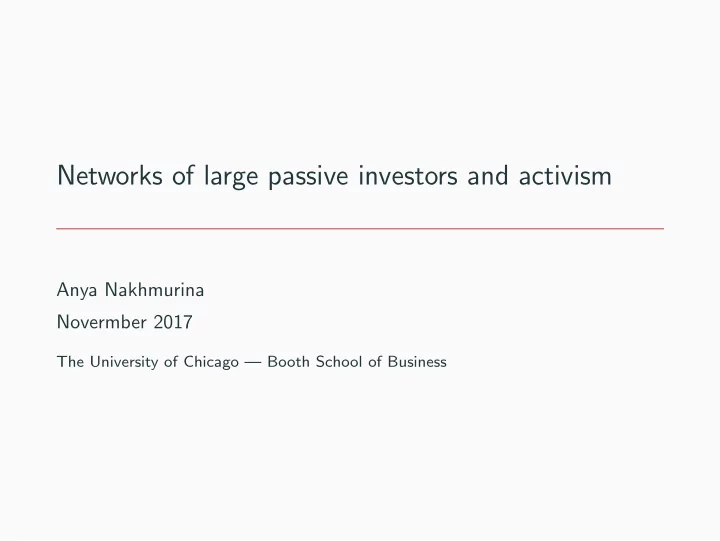

Networks of large passive investors and activism Anya Nakhmurina Novermber 2017 The University of Chicago — Booth School of Business
Capital Structure of a Firm
Capital Structure of the Firm • Capital structure of the firm consists of debt and equity: Equity Debt
Capital Structure of the Firm • Capital structure of a company consists of debt and equity: Equity Debt
Capital Structure of the Firm • Capital structure of a company consists of debt and equity: Equity Debt • Everyone who buys shares of the public firm is entitled to: • dividends • attending and voting at shareholder meetings • submitting a proposal at the shareholder meeting (if ownership exceeds certain percentage) • calling extraordinary shareholder meeting (if ownership exceeds certain percentage)
Activist Investors
Activist Investors. Who are they? Activist - an investor that purchases public company’s shares with the goal of effecting a major change in the company.
Activist Investors. Who are they? Activist - an investor that purchases public company’s shares with the goal of effecting a major change in the company. • A Russian activist:
Activist Investors. Who are they? Activist - an investor that purchases public company’s shares with the goal of effecting a major change in the company. • Happened this Friday, Nov. 3rd:
Activist Investors. Who are they? Activist - an investor that purchases public company’s shares with the goal of effecting a major change in the company. Activists are monitoring what the company is doing, and trying to fix potential inefficiencies.
Activist Investors vs. Passive Investors Activist - an investor that purchases public company’s shares with the goal of effecting a major change in the company. Passive investors - investors not actively engaging with the company. Example: mutual funds, index funds, etc. Figure 1: % of total market cap held by passively managed funds.
This Paper
Big Question: Why firms do what they do? • How does shareholder monitoring affect corporate behavior? • Emerging dynamics: more and more outsiders coming in and trying to exert changes through shareholder activism • One extreme example: Microsoft in 2012 “When a low-profile activist investor gained a board seat at Microsoft Corp. two years ago, corporate boards around the country were stunned. How had a shareholder with less than 1% of the software giant’s stock forced its way into the board- room? It turns out that ValueAct Capital Management LP had some serious muscle behind the scenes ... some of Mi- crosoft’s biggest stockholders – large mutual-fund companies not known for rocking the boat...” (WSJ)
Smaller Question • What does it take for the an outsider activist to be able to affect change? • Do passive shareholders (e.g. large mutual funds) play a role? • Can we predict activists’ success based on observable measures of activist’s interactions with a network of passive investors?
Revealed preference approach
Capital Structure - in more detail Activist Passive Investor Debt
Equity Structure: another way to look at it
Activist and Passive Investor are ”connected” via investment portfolio
Activist and Passive Investor are ”connected” via investment portfolio
Activist and Passive Investor are ”connected” via investment portfolio
Activist and Passive Investor are ”connected” via investment portfolio
Activist and Passive Investor link defined
Activist-Passive Investor Network constructed P P P P P P P A P P A P P P P P P P P P P P A P P P P P P P P P P A P P A P P P P P P P
Activist Attacks the Target P P P P P P P A P P A P T ARGET P P P P P P P P P P A P P P P P P P P P P A P P A P P P P P P P
Conclusion
Wrapping up... • New insight into a particular mechanism of shareholder monitoring • Results suggest that passive investors play significant role in activists’ campaigns
Wrapping up... • New insight into a particular mechanism of shareholder monitoring • Results suggest that passive investors play significant role in activists’ campaigns Thank you!
Recommend
More recommend